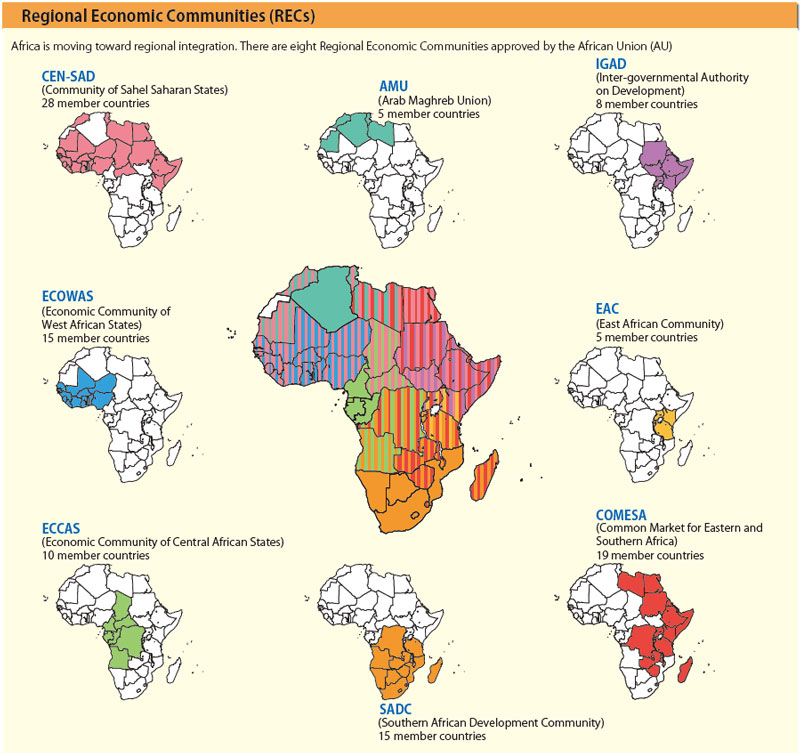Diplomatic Bluebook 2015
Chapter 2
Japan’s Foreign Policy that Takes a Panoramic Perspective of the World Map
1.Strengthening Japan-Africa Relations through Tokyo International Conference on African Development (TICAD) Process
(1) TICAD Process as the pillar of Diplomacy toward Africa
The important pillar of Japan’s diplomacy toward Africa is the Tokyo International Conference on African Development (TICAD) process that has been in place for over 20 years. Since 1993, TICAD summit meetings have been held in Japan once every five years, as well as follow-up ministerial-level meetings and other events for broad discussions on African development.
Japan has been taking the lead in conducting TICAD jointly with the United Nations, UNDP, the World Bank and the African Union Commission (AUC). This is to put into practice the fundamental philosophies of Japan’s diplomacy toward Africa: “ownership” (self-help efforts) of Africa and “partnership” with the international community including Japan.
The Fifth Tokyo International Conference on African Development (TICAD V) held in Yokohama in June 2013 was the largest-scale international conference ever hosted by Japan. In order to realize “quality growth” in Africa, Japan has been steadily implementing assistance under the three pillars of TICAD V: “robust and sustainable economy,” “inclusive and resilient society,” and “peace and stability.”
All previous TICAD summit meetings took place in Japan. In recent years, however, with enhanced “ownership” of Africa against the backdrop of recent developments on the continent including rising population, economic growth, African side has requested TICAD summit meeting to be held on a rotating basis in Japan and Africa once every three years and to hold the next TICAD summit meeting in Africa. At the Second Japan-African Regional Economic Communities (RECs) Summit in September 2014, Prime Minister Abe announced that, valuing the African “ownership”, Japan intended to the next TICAD summit meeting in Africa, and hold TICAD on a rotating basis in Japan and Africa. The TICAD summit meeting which will be held for the first time in Africa is expected to further deepen the TICAD process and develop Japan-Africa relations into a new phase.
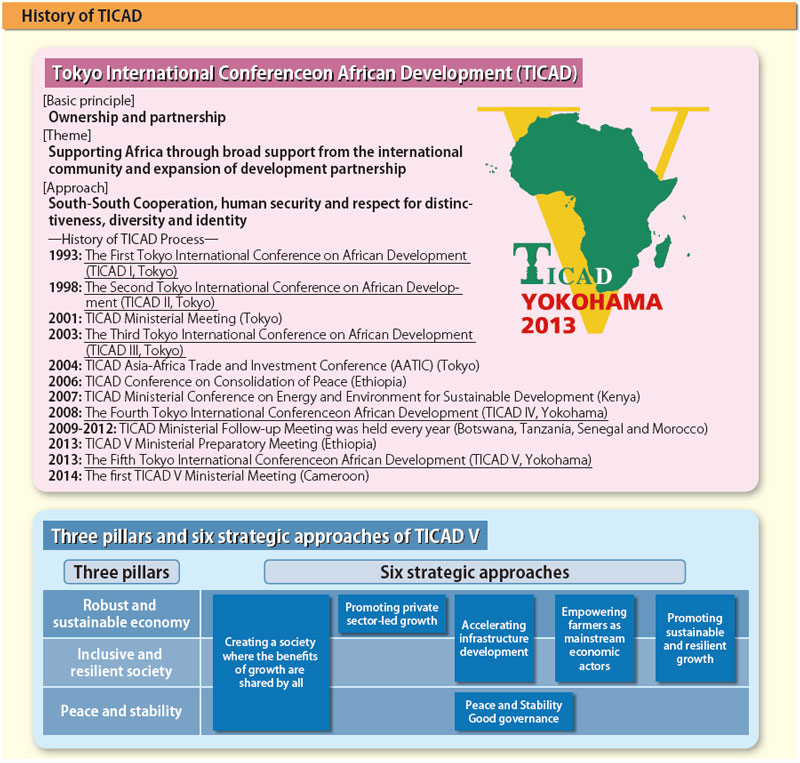
(2) First TICAD V Ministerial Meeting
The first TICAD V Ministerial Meeting was held in Yaounde, the capital city of the Republic of Cameroon, in May 2014, co-chaired by Foreign Minister Kishida and Mr. Pierre Moukoko Mbonjo, Minister of External Relations of Cameroon, with the participation of Mr. Eto, State Minister of Agriculture, Forestry and Fisheries. Paticipants had discussions on important issues for Africa and the international society: “agriculture, food and nutrition security” “empowering women and youth” and “post-2015 development agenda”. Foreign Minister Kishida reported that the Government of Japan had implemented its assistance in 2013 faster than expected (3.51 billion US dollars of official development assistance (ODA), which accounts for approximately 25% of Japan’s commitment at TICAD V, and 2.08 billion US dollars in other assistance), which was highly appreciated by African countries.
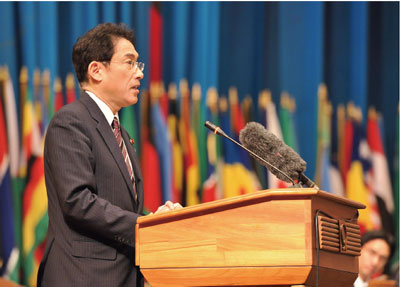 Foreign Minister Kishida delivering a speech at the First TICAD V Ministerial Meeting (Yaounde, Cameroon, May 4, 2014)
Foreign Minister Kishida delivering a speech at the First TICAD V Ministerial Meeting (Yaounde, Cameroon, May 4, 2014)
 Senior Vice-Minister of Agriculture, Forestry and Fisheries Eto observing the Upland Rice Development Project of the Tropical Forest Zone (implemented by JICA) in Cameroon (Yaounde, May 3, 2014)
Senior Vice-Minister of Agriculture, Forestry and Fisheries Eto observing the Upland Rice Development Project of the Tropical Forest Zone (implemented by JICA) in Cameroon (Yaounde, May 3, 2014)
(3) Promoting Japan-Africa Trade and Investment through Public-Private Partnership
In August 2014, a Public and Private Sector Joint Mission for Promoting Trade and Investment in Africa, which was the eighth mission since TICAD IV, was dispatched to Ethiopia, Rwanda and Tanzania with the aim of promoting trade and investment between Japan and Africa. The delegation consisting of 17 Japanese companies, independent administrative institutions, relevant ministries and others was headed by Parliamentary Vice-Minister for Foreign Affairs Ishihara. During the visit, the members of the delegation attended seminars on trade and investment and met with the heads of state and ministers of each country.
 Senior Vice-Minister of Agriculture, Forestry and Fisheries Eto observing the Upland Rice Development Project of the Tropical Forest Zone (implemented by JICA) in Cameroon (Yaounde, May 3, 2014)
Senior Vice-Minister of Agriculture, Forestry and Fisheries Eto observing the Upland Rice Development Project of the Tropical Forest Zone (implemented by JICA) in Cameroon (Yaounde, May 3, 2014)
Public and private sectors also share information, exchange opinions and disseminate information related to African business through the “TICAD Public and Private Round Table”. Following the first meeting in December 2013, the second Round Table was held with the attendance of 47 private companies in December 2014 in addition to three working-level meetings during the year. They shared the implementation status of TICAD V assistance measures and initiatives concerning business with Africa and confirmed continued integrated cooperation of public and private sectors toward the next TICAD summit meeting.
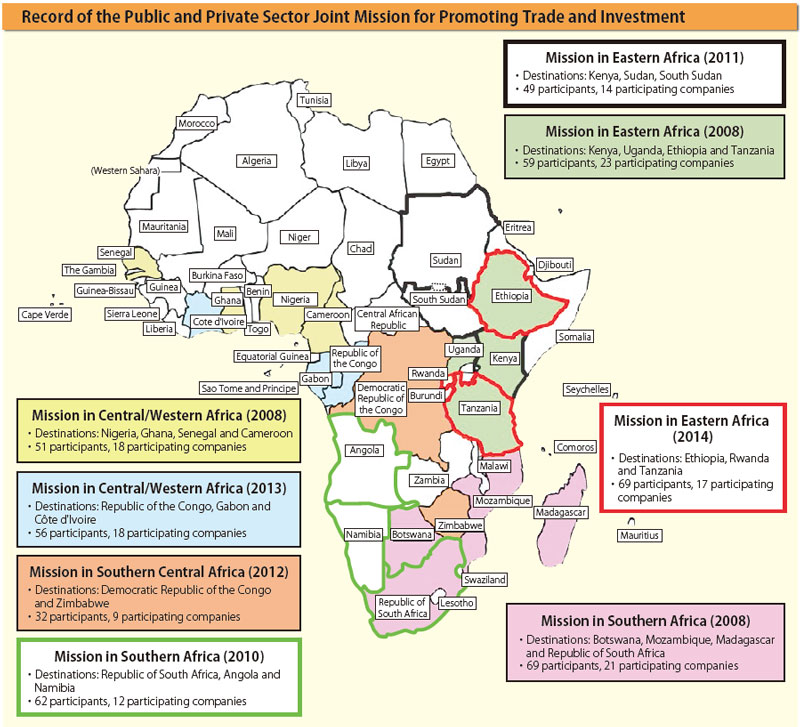
(4) Strengthening Relations with Regional Economic Communities (RECs)
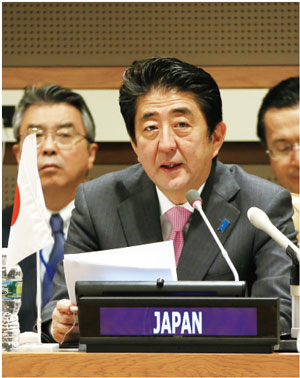 Prime Minister Abe delivering a speech at the Second Japan-African RECs Summit (New York, US, September 24, 2014; Source: Cabinet Public Relations Office)
Prime Minister Abe delivering a speech at the Second Japan-African RECs Summit (New York, US, September 24, 2014; Source: Cabinet Public Relations Office)
Further economic growth of Africa with many countries of small economic scale requires regional cooperation beyond individual states. In the “Japan Revitalization Strategy” revised in 2014, Japan sets forth promotion of initiatives of RECs as a measure leading to the creation of a broader market in Africa. Putting the policy into practice, Prime Minister Abe held the second Japan RECs summit in New York in September 2014 sequentially from the previous year and discussed infrastructure development that is stressed in Africa, with the participation of President Mahama of Ghana, Prime Minister Hailemariam of Ethiopia among others. They shared the recognition on the importance of infrastructure development in broad areas and confirmed to strengthen multilayered relations between Japan and Africa through RECs.
